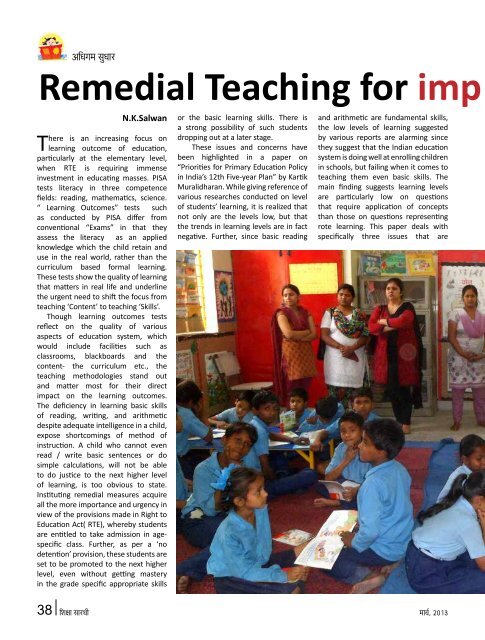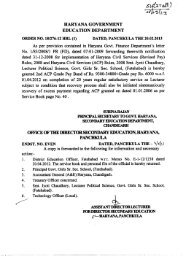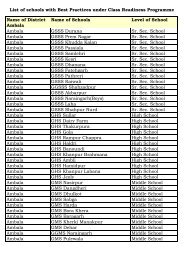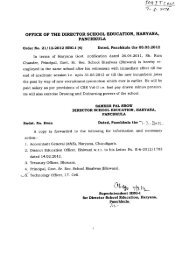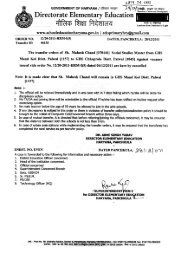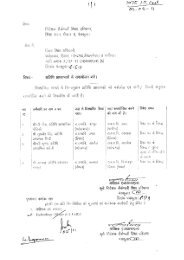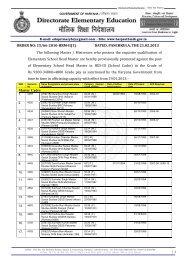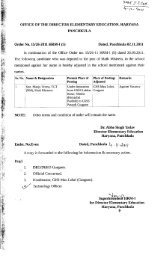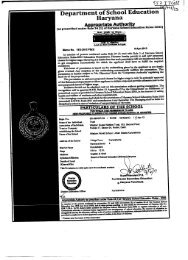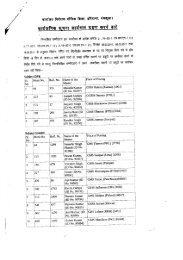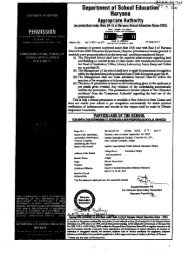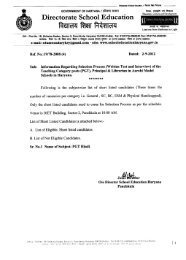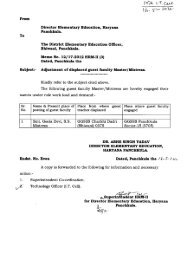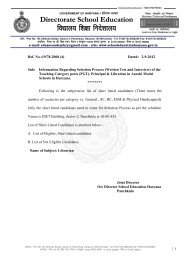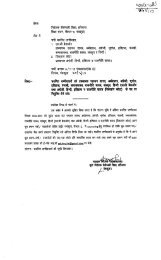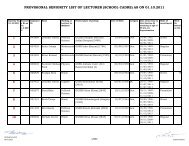Ĩæà ÃÃðÃļŧð įÃà Ãŧæ ·ĪÃUb ·Īà ÅÃðīŧð įâÃU ©UÃUæ·ĪÃU
Ĩæà ÃÃðÃļŧð įÃà Ãŧæ ·ĪÃUb ·Īà ÅÃðīŧð įâÃU ©UÃUæ·ĪÃU
Ĩæà ÃÃðÃļŧð įÃà Ãŧæ ·ĪÃUb ·Īà ÅÃðīŧð įâÃU ©UÃUæ·ĪÃU
Create successful ePaper yourself
Turn your PDF publications into a flip-book with our unique Google optimized e-Paper software.
¥çÏ»× âéÏæÚU<br />
Remedial Teaching for imp<br />
N.K.Salwan<br />
There is an increasing focus on<br />
learning outcome of education,<br />
particularly at the elementary level,<br />
when RTE is requiring immense<br />
investment in educating masses. PISA<br />
tests literacy in three competence<br />
fields: reading, mathematics, science.<br />
“ Learning Outcomes” tests such<br />
as conducted by PISA differ from<br />
conventional “Exams” in that they<br />
assess the literacy as an applied<br />
knowledge which the child retain and<br />
use in the real world, rather than the<br />
curriculum based formal learning.<br />
These tests show the quality of learning<br />
that matters in real life and underline<br />
the urgent need to shift the focus from<br />
teaching ‘Content’ to teaching ‘Skills’.<br />
Though learning outcomes tests<br />
reflect on the quality of various<br />
aspects of education system, which<br />
would include facilities such as<br />
classrooms, blackboards and the<br />
content- the curriculum etc., the<br />
teaching methodologies stand out<br />
and matter most for their direct<br />
impact on the learning outcomes.<br />
The deficiency in learning basic skills<br />
of reading, writing, and arithmetic<br />
despite adequate intelligence in a child,<br />
expose shortcomings of method of<br />
instruction. A child who cannot even<br />
read / write basic sentences or do<br />
simple calculations, will not be able<br />
to do justice to the next higher level<br />
of learning, is too obvious to state.<br />
Instituting remedial measures acquire<br />
all the more importance and urgency in<br />
view of the provisions made in Right to<br />
Education Act( RTE), whereby students<br />
are entitled to take admission in agespecific<br />
class. Further, as per a ‘no<br />
detention’ provision, these students are<br />
set to be promoted to the next higher<br />
level, even without getting mastery<br />
in the grade specific appropriate skills<br />
or the basic learning skills. There is<br />
a strong possibility of such students<br />
dropping out at a later stage.<br />
These issues and concerns have<br />
been highlighted in a paper on<br />
“Priorities for Primary Education Policy<br />
in India’s 12th Five-year Plan” by Kartik<br />
Muralidharan. While giving reference of<br />
various researches conducted on level<br />
of students’ learning, it is realized that<br />
not only are the levels low, but that<br />
the trends in learning levels are in fact<br />
negative. Further, since basic reading<br />
and arithmetic are fundamental skills,<br />
the low levels of learning suggested<br />
by various reports are alarming since<br />
they suggest that the Indian education<br />
system is doing well at enrolling children<br />
in schools, but failing when it comes to<br />
teaching them even basic skills. The<br />
main finding suggests learning levels<br />
are particularly low on questions<br />
that require application of concepts<br />
than those on questions representing<br />
rote learning. This paper deals with<br />
specifically three issues that are<br />
38 çàæÿææ âæÚUÍè¤<br />
×æ¿üU, w®vx


